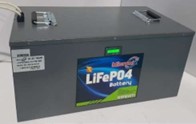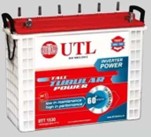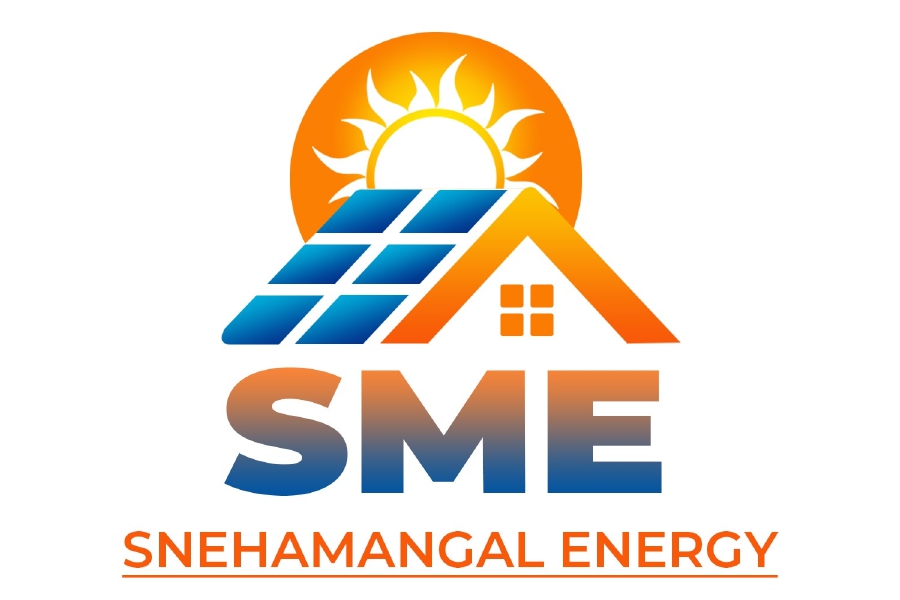Solar Battery & LifePO4 Battery
- A solar battery is an energy storage device that can be paired with an off-grid and hybrid solar system. It is also known as a solar battery. Solar batteries are designed to connect with a solar charger controller or solar inverter to provide power backup.
- These next generation batteries will change the way you use solar You can use a solar battery to store the extra power generated by your solar panels throughout the day and use it later as needed.
Installing a solar battery at your home allows you to use more solar power at home while using less grid power. Once your battery is fully charged, your solar system will transmit power to the grid. If your grid electricity goes out frequently and you need backup power, solar storage options are worth considering.
Types of Solar Battery
When it comes to the different types of solar batteries, there are primarily two types.

Lithium-ion Solar Battery (LiFePO4)

Tall Tubular Solar Battery (Lead Acid)
Tall Tubular Solar Battery
A lead-acid tall tubular battery is the most successful, oldest, and reliable solar battery technology. These solar batteries are C-10 rated batteries, specially designed to meet the needs of all solar applications.
A lead-acid tall tubular battery requires to top-up with water every 3 to 6 months and can store more power than any other battery.
Solar tubular batteries are deep cycle solar batteries that have been thoroughly tested and can be used in off-grid solar systems, hybrid solar systems, and solar home lighting systems.
Advantages of solar tubular batteries
- High-efficiency batteries
- More than 1500 life cycles
- 5 to 7 years long working life
- Cost-effective solar product
- Easy to maintain, install, and access.
- No need of heavy maintenance
- Very low repair/maintenance cost
Disadvantages of solar tubular batteries
- Tall tubular batteries are heavy
- You need to refill these batteries timely
- More space is required compared to lithium-ion batteries
Lithium-ion Solar Battery
Lithium-ion is another popular type of solar battery, well known for its high current rating, and long cycle life. The most significant advantage of lithium-ion batteries is their extremely long life-cycle (up to 5000 cycles) and high charge and discharge capabilities, which allows you to harvest more energy from your solar panel.
The lithium ion phosphate (LiFePO4) battery is the best type of lithium-ion battery for your solar power application. LiFePO4 batteries are completely safe, non-flammable, stable for 15 to 20 years, and require no maintenance.
It also has good electrical performance and a low resistance. For these reasons, lithium- ion batteries are an excellent choice for a wide range of solar applications, including all- in-one solar street lights and solar-powered vehicles.
Advantages of Lithium-ion Solar Battery:
- 95% depth of discharge (DoD)
- More than 5000 life cycles
- Higher energy density
- More efficient than Lead-Acid batteries
- Do not require maintenance
- Eco-friendly solar batteries
Disadvantages of Lithium-ion Solar Battery:
- Comparatively more expensive
Solar V/s Normal Battery
Solar battery is a good substitute for the normal battery because it is not only an environmentally friendly option, but it also has the potential to last longer than traditional batteries.
| Normal Battery | Solar Battery |
| Operates only on Grid Power | Operates on Solar Power & Grid Power |
| Use with normal inverter/UPS | Used with solar inverters and solar system |
| C20 and above rated battery | C10 rated battery |
| Provide less power & support less load | Provide more power & support more load |
| Cannot be deep discharged rate | Can be deep discharged rate |
| Slow Charging & discharging rate | Fast Charging & discharging rate |
| 3 to 5 hours backup | 3 to 5 hours backup |
| Less Expensive | More Expensive |
| 3-5 Years Working Life | 7-9 Years working Life |
| Upto 3 years warrenty | Upto 5 years warrenty |
Features of Solar Battery
The popularity of solar batteries has been increasing for the last few years as a way to fulfill the world’s growing clean energy demand. These batteries have been specifically designed for used in high-performance solar system.
Excellent Efficiency
The overall success of a solar system depends on storage efficiency. Therefore, solar batteries have an excellent efficiency level. A solar battery maximizes the use of your solar panel system and increases your energy independence.
Superior Life Cycle
The expected life of a solar battery is very long. Furthermore, depending on the type of solar battery, they have an extremely long life cycle. Lead-acid tall tubular batteries have a life cycle of 1500 cycles, whereas lithium-ion batteries have a life cycle of up to 5000 cycles.
High Round Trip Efficiency
Solar batteries have high round trip efficiency. This means that the power loss during transmission will be very less and you will be able to use most of the stored electricity.
Tuff Futuristic Design
Solar batteries are made of highly-quality materials and have a very premium appearance. They are robust and suitable for off-grid and hybrid solar systems. You can install them anywhere in your home.
Water Level Indicators
One of the unique features of solar batteries is that they include water level indicators. Water level indicators will tell you how much water is left in your battery and when it is time to recharge it.
Ultra-Low Maintenance
Solar batteries require very little maintenance. These batteries require to be top-up with water every 3 to 6 months. There is no additional repairing or maintenance cost for these batteries.
